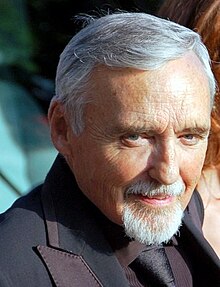Dennis Hopper
Dennis Lee Hopper (May 17, 1936 – May 29, 2010) was an American actor, filmmaker, photographer and artist. He attended the Actors Studio, made his first television appearance in 1954, and soon after appeared alongside James Dean in Rebel Without a Cause (1955) and Giant (1956). In the next ten years he made a name in television, and by the end of the 1960s had appeared in several films. Hopper also began a prolific and acclaimed photography career in the 1960s.
Hopper made his directorial film debut with Easy Rider (1969), which he and co-star Peter Fonda wrote with Terry Southern. The film earned Hopper a Cannes Film Festival Award for "Best First Work" and a nomination for the Academy Award for Best Original Screenplay (shared with Fonda and Southern). Journalist Ann Hornaday wrote: "With its portrait of counterculture heroes raising their middle fingers to the uptight middle-class hypocrisies, Easy Rider became the cinematic symbol of the 1960s, a celluloid anthem to freedom, macho bravado and anti-establishment rebellion". Film critic Matthew Hays notes that, "no other persona better signifies the lost idealism of the 1960s than that of Dennis Hopper".
Hopper was unable to capitalize on his Easy Rider success for several years. In 1970 he filmed The Last Movie, cowritten by Stewart Stern and photographed by Laszlo Kovacs in Peru, and completed production in 1971. It won the prestigious CIDALC Award at that year's Venice Film Festival, but Universal Studios leaders expected a blockbuster like Easy Rider, and did not like the film or give it an enthusiastic release, while American film audiences found it confounding - as convoluted as an abstract painting. On viewing the first release print, fresh from the lab, in his screening room at Universal, MCA founder Jules Stein rose from his chair and said, "I just don't understand this younger generation." He worked on various small projects until he found new fame for his role as the American photojournalist in Apocalypse Now (1979). He went on to helm his second directorial work Out of the Blue (1980), for which he was again honored at Cannes, and appeared in Rumble Fish (1983) and The Osterman Weekend (1983). He saw a career resurgence in 1986 when he was widely acclaimed for his performances in Blue Velvet and Hoosiers, the latter of which saw him nominated for the Academy Award for Best Supporting Actor. His third directorial outing came about through Colors (1988), followed by an Emmy-nominated lead performance in Paris Trout (1991). Hopper found even greater fame for portraying the villains of the films Super Mario Bros. (1993), Speed (1994) and Waterworld (1995).
...
Wikipedia

